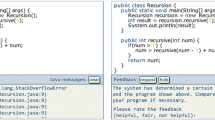Abstract
In the past five years, researchers studied the use of examples compared to tutored problems in different domains, yet the results are not conclusive to decide whether they could replace tutored problems or not. Due to different results in using examples for Intelligent Tutoring System (ITS), there is still a research potential to investigate examples’ effects on learning compared to tutored problems. We plan to expand this area to Constraint Based Modeling (CBM) tutors using SQL-Tutor. The result of this study would allow us to develop more effective and efficient ITSs.
Access this chapter
Tax calculation will be finalised at checkout
Purchases are for personal use only
Similar content being viewed by others
References
Aleven, V.A., Koedinger, K.R.: An effective metacognitive strategy: learning by doing and explaining with a computer-based cognitive tutor. Cognitive Science 26(2), 147–179 (2002)
Atkinson, R.K., Derry, S.J., Renkl, A., Wortham, D.: Learning from examples: Instructional principles from the worked examples research. Review of Educational Research 70(2), 181–214 (2000)
van Gog, T., Kester, L., Paas, F.: Effects of worked examples, example-problem, and problem-example pairs on novices’ learning. Contemporary Educational Psychology 36(3), 212–218 (2011)
Mayer, R.E.: Multimedia Learning, 2nd edn. Cambridge University Press, New York (2009)
McLaren, B., Isotani, S.: When Is It Best to Learn with All Worked Examples? In: Biswas, G., Bull, S., Kay, J., Mitrovic, A. (eds.) AIED 2011. LNCS, vol. 6738, pp. 222–229. Springer, Heidelberg (2011)
Mitrovic, A.: An intelligent SQL Tutor on the web. Int. J. Artif. Intell. Ed. 13, 173–197 (2003)
Mitrovic, A., Weerasinghe, A.: Revisiting ill-definedness and the consequences for ITSs. In: Proceeding of the 2009 Conference on Artificial Intelligence in Education: Building Learning Systems that Care: From Knowledge Representation to Affective Modelling, pp. 375–382. IOS Press, Amsterdam (2009)
Rourke, A., Sweller, J.: The worked-example effect using ill-defined problems: Learning to recognise designers’ styles. Learning and Instruction 19(2), 185–199 (2009)
Schwonke, R., Renkl, A., Krieg, C., Wittwer, J., Aleven, V., Salden, R.: The worked-example effect: Not an artefact of lousy control conditions. Computers in Human Behavior 25, 258–266 (2009)
Author information
Authors and Affiliations
Editor information
Editors and Affiliations
Rights and permissions
Copyright information
© 2012 Springer-Verlag Berlin Heidelberg
About this paper
Cite this paper
Shareghi Najar, A., Mitrovic, A. (2012). Using Examples in Intelligent Tutoring Systems. In: Cerri, S.A., Clancey, W.J., Papadourakis, G., Panourgia, K. (eds) Intelligent Tutoring Systems. ITS 2012. Lecture Notes in Computer Science, vol 7315. Springer, Berlin, Heidelberg. https://doi.org/10.1007/978-3-642-30950-2_76
Download citation
DOI: https://doi.org/10.1007/978-3-642-30950-2_76
Publisher Name: Springer, Berlin, Heidelberg
Print ISBN: 978-3-642-30949-6
Online ISBN: 978-3-642-30950-2
eBook Packages: Computer ScienceComputer Science (R0)




